Nachbehandlung/en: Unterschied zwischen den Versionen
(Die Seite wurde neu angelegt: „frame|alt=Nachbehandlung|link=https://www.crazy-factory.com/de/c/Mehr/Reinigung-und-Pflege/ <h4>Aftercare</h4>“) |
(Die Seite wurde neu angelegt: „<i>Aftercare</i><br> <br>Unlike a tattoo, which basically skims the surface of your skin, piercings go much deeper. If you want yours to go on giving pleasure for many years to come, you must take the time to look after it. <br><br> Don’t change the piercing jewellery for the first four months, as this will place unnecessary stress on the wound and delay…“) |
||
| Zeile 3: | Zeile 3: | ||
<h4>Aftercare</h4> | <h4>Aftercare</h4> | ||
<i>[[Special:MyLanguage/Pflege|Aftercare]]</i><br> | |||
<i>[[Special:MyLanguage/Pflege| | <br>Unlike a tattoo, which basically skims the surface of your skin, piercings go much deeper. If you want yours to go on giving pleasure for many years to come, you must take the time to [[Special:MyLanguage/Pflege|look after it]]. | ||
<br> | <br><br> | ||
<br> | Don’t change the piercing [[Special:MyLanguage/Piercingschmuck|jewellery]] for the first four months, as this will place unnecessary stress on the wound and delay the healing process. If a crust forms on the hole, don’t scratch it off, as this may reopen the wound. If you absolutely have to get rid of it, try softening it with water under the shower so that it detaches of its own accord. | ||
<br> | <br><br> | ||
<br> | Otherwise, leave your new piercing alone. If you must touch it, wash your hands and only touch the balls of the ring or plug. Your hands are the number one breeding ground for bacteria. Pools, solariums and saunas also provide a favourable environment for microorganisms, and should be avoided until your piercing has fully healed. In many cases, you’ll need to be careful when engaging in strenuous [[Special:MyLanguage/Sport|exercise]]. | ||
<br> | <br><br> | ||
<br> | It’s also important to clean your piercing in the right way, ideally using a slightly damp Q-Tip and wound disinfectant. Do this twice a day, and then gently move the jewellery back and forth so that the disinfectant gets into the channel. Some piercers recommend using your own urine as a disinfectant. When you clean the jewellery, wash it thoroughly with water and make sure there are no bits of soap left behind. | ||
<br><br> | |||
If you have a mouth piercing, gently rinse it after meals with water or camomile tea. | |||
<br><br> | |||
And if yours is a [[Special:MyLanguage/Intimpiercings|genital piercing]], you’ll need to refrain from sexual activity. Body fluids such as saliva, vaginal fluid and sperm increase the risk of infection. For more information see [[Special:MyLanguage/Sex|sex]] with a genital piercing. | |||
Aktuelle Version vom 24. September 2021, 13:07 Uhr
Aftercare
Aftercare
Unlike a tattoo, which basically skims the surface of your skin, piercings go much deeper. If you want yours to go on giving pleasure for many years to come, you must take the time to look after it.
Don’t change the piercing jewellery for the first four months, as this will place unnecessary stress on the wound and delay the healing process. If a crust forms on the hole, don’t scratch it off, as this may reopen the wound. If you absolutely have to get rid of it, try softening it with water under the shower so that it detaches of its own accord.
Otherwise, leave your new piercing alone. If you must touch it, wash your hands and only touch the balls of the ring or plug. Your hands are the number one breeding ground for bacteria. Pools, solariums and saunas also provide a favourable environment for microorganisms, and should be avoided until your piercing has fully healed. In many cases, you’ll need to be careful when engaging in strenuous exercise.
It’s also important to clean your piercing in the right way, ideally using a slightly damp Q-Tip and wound disinfectant. Do this twice a day, and then gently move the jewellery back and forth so that the disinfectant gets into the channel. Some piercers recommend using your own urine as a disinfectant. When you clean the jewellery, wash it thoroughly with water and make sure there are no bits of soap left behind.
If you have a mouth piercing, gently rinse it after meals with water or camomile tea.
And if yours is a genital piercing, you’ll need to refrain from sexual activity. Body fluids such as saliva, vaginal fluid and sperm increase the risk of infection. For more information see sex with a genital piercing.
